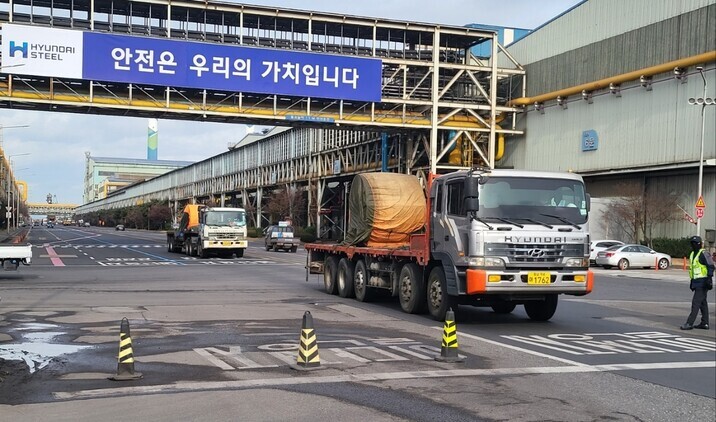hankyoreh
Links to other country sites 다른 나라 사이트 링크
US slaps anti-dumping duties on Korean steelmakers, calling cheap electricity a de facto subsidy

The US Department of Commerce has imposed countervailing duties on Hyundai Steel and Dongkuk Steel, alleging that South Korea’s cheap electricity prices amount to a de facto government subsidy for the steelmakers.
This is the first time the US government has used claims of cheap electricity rates to impose tariffs. The South Korean government’s delay in raising electricity prices has snowballed into a trade issue.
According to the Ministry of Trade, Industry and Energy (MOTIE) on Thursday, the US Department of Commerce made a final announcement in its September Federal Register to impose countervailing duties of 1.08% each on thick plates from Hyundai Steel and Dongkuk Steel for the 2021 model year.
Countervailing duties, also known as anti-dumping duties, are tariffs imposed on an exporting country’s products to prevent damage when the exporting country provides subsidies or other benefits to certain goods, affecting the competitiveness of the importing country’s products. The US Department of Commerce noted that South Korea’s cheap industrial electricity acted as a de facto subsidy to South Korean steelmakers, according to the MOTIE.
The US steel industry has been complaining for years that South Korea’s electricity prices are too low, and therefore functioning as subsidies for steelmakers. South Korea’s government and steel industry have been trying to overturn the US Commerce Department’s preliminary ruling in February that South Korea must pay a 1.1% countervailing duty on US exported thick plates, but have been unsuccessful in changing the final determination.
The countervailing duties are believed to have been finalized by the US Commerce Department after it found that South Korean industrial electricity prices remained at below-cost levels after 2021.
“It seems to be an issue that the cost recovery rate [the ratio of cost to sales] of industrial electricity has not exceeded 100% since 2021,” a MOTIE official said.
Korea Electric Power Corporation’s (KEPCO) overall cost recovery rate for electricity bills dropped from 101.3% in 2020 to 85.9% in 2021 and 64.2% in 2022. This is because the cost of electricity has increased due to rising international fuel prices, which the government has not adequately reflected in electricity bills.
Ahead of this final decision, the US Department of Commerce reportedly conducted an investigation into KEPCO last month. “The US doesn’t impose countervailing duties when KEPCO’s in the black, but since it’s been in the red for so long, it seems to have been interpreted as a government subsidy,” said a steel industry insider.
Korea is watching closely to see if the US Commerce Department’s decision will have a cascading effect on other industries. Hyundai exports 40,000 metric tons of plates to the US annually, about 2% of its total production, but if electricity prices remain below cost, it could continue to cause trade problems.
The government and industry are considering filing a complaint with the US Court of International Trade. A MOTIE official commented that Korea would “find a way to minimize the damage to the domestic industry caused by countervailing duties.”
On the same day, Hyundai Steel commented, “There are some unclear points in the final ruling, so we are planning a follow-up response.”
An official from Dongkuk Steel said, “The volume of our exports to the US is not large, so the direct impact on the company is not significant, but we will closely monitor the situation and devise a response.”
By Kim Hoe-seung, senior staff writer; Ko Han-sol, staff reporter
Please direct questions or comments to [english@hani.co.kr]

Editorial・opinion
![[Editorial] Intensifying US-China rivalry means Seoul must address uncertainty with Beijing sooner than later [Editorial] Intensifying US-China rivalry means Seoul must address uncertainty with Beijing sooner than later](https://flexible.img.hani.co.kr/flexible/normal/500/300/imgdb/original/2024/0517/8117159322045222.jpg) [Editorial] Intensifying US-China rivalry means Seoul must address uncertainty with Beijing sooner than later
[Editorial] Intensifying US-China rivalry means Seoul must address uncertainty with Beijing sooner than later![[Column] When ‘fairness’ means hate and violence [Column] When ‘fairness’ means hate and violence](https://flexible.img.hani.co.kr/flexible/normal/500/300/imgdb/original/2024/0516/7417158465908824.jpg) [Column] When ‘fairness’ means hate and violence
[Column] When ‘fairness’ means hate and violence- [Editorial] Yoon must stop abusing authority to shield himself from investigation
- [Column] US troop withdrawal from Korea could be the Acheson Line all over
- [Column] How to win back readers who’ve turned to YouTube for news
- [Column] Welcome to the president’s pity party
- [Editorial] Korea must respond firmly to Japan’s attempt to usurp Line
- [Editorial] Transfers of prosecutors investigating Korea’s first lady send chilling message
- [Column] Will Seoul’s ties with Moscow really recover on their own?
- [Column] Samsung’s ‘lost decade’ and Lee Jae-yong’s mismatched chopsticks
Most viewed articles
- 1[Editorial] Transfers of prosecutors investigating Korea’s first lady send chilling message
- 2For new generation of Chinese artists, discontent is disobedience
- 3[Photo] 1,200 prospective teachers call death of teacher “social manslaughter”
- 4[Exclusive] Unearthed memo suggests Gwangju Uprising missing may have been cremated
- 5[Column] Samsung’s ‘lost decade’ and Lee Jae-yong’s mismatched chopsticks
- 6[Column] When ‘fairness’ means hate and violence
- 7Xi, Putin ‘oppose acts of military intimidation’ against N. Korea by US in joint statement
- 8S. Korea “monitoring developments” after report of secret Chinese police station in Seoul
- 9[Special reportage- part I] Elderly prostitution at Jongmyo Park
- 10[News analysis] Samsung in management crisis due to owner risk